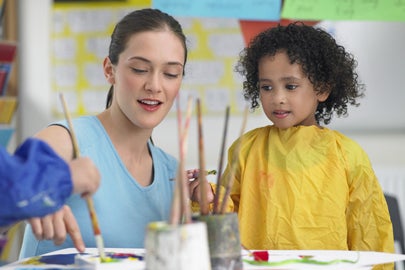|
October 23, 2014
Stanford researchers see trouble ahead for kindergarten students with low self-regulation unless parents and teachers help
Academic success for a first-grader depends in part on both high self-regulation in kindergarten and a low-conflict relationship between student and teacher. Parents can help students improve self-regulation and teachers can learn to provide a better classroom environment for all students. By Rex Sanders

Researchers at Stanford and UCSF show that kindergarten students are more likely to succeed in school if they have high self-regulation and a supportive classroom environment. (Photo: bikeriderlondon/ Shutterstock) In the famous Stanford marshmallow experiment, young children were offered one small marshmallow now, or two marshmallows in 15 minutes if they could resist eating the first one. Children with low self-regulation ate the first marshmallow. In follow-up studies these youngsters tended to grow up to be teenagers with lower SAT scores, higher body mass indexes and higher rates of drug abuse.
Now, a new Stanford study shows that trouble can start as early as kindergarten for children with low self-regulation. The good news is that parents and teachers can help prevent these problems.
Doctoral candidate Ximena Portilla and Assistant Professor Jelena Obradović of the Graduate School of Education, with colleagues at the University of California, San Francisco, studied kindergarten students and classroom environments and then followed those students into first grade. Their study was published in the journal Child Development.
"Challenges with self-regulation place young children at risk for negative relationships with teachers and lower academic functioning," Portilla said.
This was one of the first studies to look at the complex interactions between student self-regulation and the classroom environment. Researchers recruited 338 kindergarten students for the study, chosen from public schools in the San Francisco Bay Area. The children came from diverse ethnic, income and family backgrounds. The team measured student behavior and the classroom environment using questionnaires filled out by parents and teachers.
Kindergarten students with low self-regulation often end up in conflict with their teachers, reducing student engagement and creating problems that continue into first grade. But teachers who are supportive and nurturing can help these students succeed.
"Children's self-regulation skills may affect the course of children's academic trajectories in elementary school," Portilla said. According to Portilla, parents should find ways to improve their children's self-regulation skills before they enter kindergarten. And teachers should get professional development opportunities to help them create a non-reactive, low-conflict classroom environment.
This research was part of the Stanford Project on Adaptation and Resilience in Kids – the SPARK Lab – using grants from the National Institute of Mental Health, the U.S. Department of Education and the Canadian Institute for Advanced Research.
Rex Sanders is an intern for Stanford News Service.
-30-
|